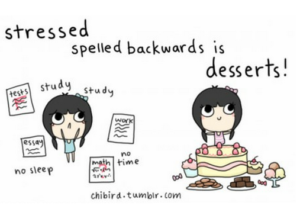Figuring out whether to use dessert, desert or deserted can be tricky. But no worries, by the time you have finished this article, all the confusion will be cleared.
Let’s start with the easy part:
Dessert or desert?
If you are thinking of the sweet dish usually eaten at the end of your meal, use dessert (/dɪˈzəːt/). This word, like so many other food-related words, comes from French. In French, the word desservir used to mean “to unserve”, which basically meant to clear the table from what had been served before. Therefore, a dessert is what we eat after the main course, not just any sweet snack during the day.
Need a tip to remember the spelling? The smart people on the Internet recommend reading the word backwards:

However, we also strongly feel that the double ss (which you cannot find in the other easily confused word desert) in dessert stands for Sweet Stuff.
Desert or deserted?
Here it can get a bit problematic. You see, these words share their root from the Latin word desertus, which means (in case your Latin is a bit rusty) “abandoned”. So far, so good, right?
Let’s start with desert. The confusion stems from the homographic nature of the word desert. Homographs are words that share the same spelling but have different meanings and pronunciation. Take tear for example: we can shed a tear after watching a sad movie, find a tear in our new sweater, or tear up our ticket after a show. Therefore, we need to see desert, desert and desert as three separate words. Confusing? Let me clarify:
- The noun desert (/ˈdɛzət/) refers to an arid land scarce in vegetation, although a more scientific definition would be “a region that has less than 254 mm (10 in) of annual rainfall or precipitation”. Even though most of us are picturing the Sahara Desert right now, according to this definition, Antarctica is a desert too! Bet you did not know that.
- The verb desert (/dɪˈzəːt/) means “to abandon” someone or something in not such a nice way. In case you need a little tip to remember this, just think of the man who promised never to run around and desert you!
- The adjective (\ˈde-zərt\) has two meanings: anything relating to or of a desert (such as those harsh desert winds), and an uninhabited place. The latter is most commonly used in the phrase “a desert island”.
And deserted?
You might wonder where deserted fits into this whole story. It is actually quite simple: while both desert and deserted refer to an uninhabited place, “a desert island” has actually never been inhabited (at least not by people), whereas “a deserted island” was inhabited and then abandoned or, if you prefer, deserted. Obviously, given that there are many more “deserted places” than “desert places”, in most situations deserted is the word to go by. Remember, even though these words are often used interchangeably by some people, they are not synonymous!


